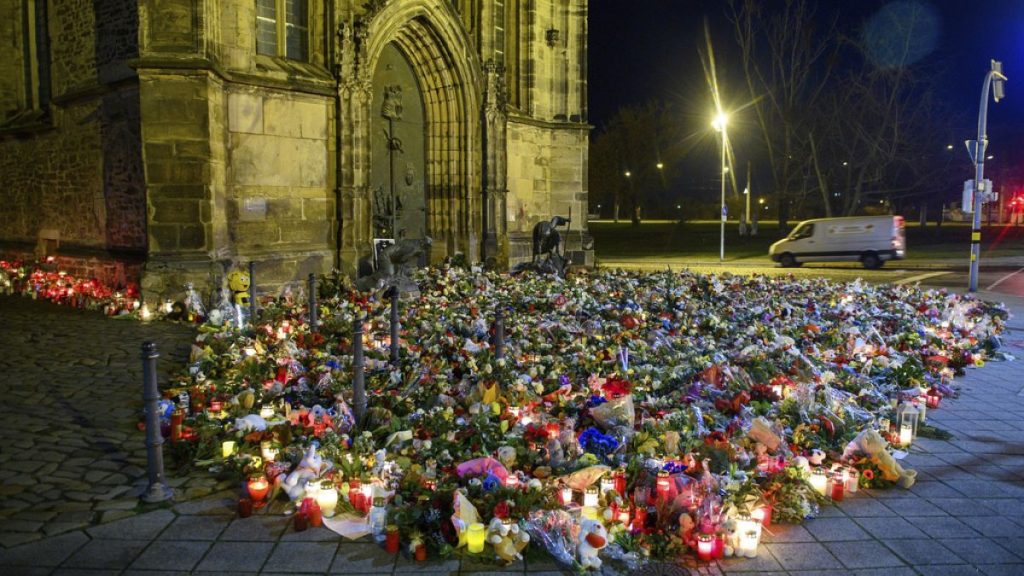The horrific car-ramming attack at the Magdeburg Christmas market has plunged Germany into a state of mourning and shaken the nation’s sense of security just weeks before snap elections. The attack, which claimed the lives of at least five individuals, including a nine-year-old boy, and injured over 200 others, has left an indelible scar on the festive season and raised concerns about the growing threat of extremism in the country. The makeshift memorial near the scene of the tragedy continues to grow, adorned with flowers, candles, and heartfelt tributes, a testament to the collective grief and solidarity of the community. The reopening of the market area on Sunday, while symbolic of resilience, is also a stark reminder of the vulnerability of public spaces and the ongoing struggle to balance safety and normalcy in the face of such threats.
The perpetrator, identified as Taleb A., a Saudi doctor who has resided in Germany since 2006, presents a complex and perplexing profile that deviates from typical extremist archetypes. Describing himself as an ex-Muslim, he reportedly harbored intense criticism of Islam while simultaneously expressing support for far-right ideologies on social media. This seemingly contradictory stance has confounded investigators and raised questions about the true motivations behind the attack. Justice Minister Volker Wissing revealed that Taleb A. had been on authorities’ radar for previous threats, but his erratic and inconsistent political pronouncements made it difficult to categorize him within established extremist frameworks, highlighting the challenges of identifying and mitigating threats from individuals who fall outside conventional profiles.
The Magdeburg attack reverberates with echoes of past tragedies, most notably the 2016 Berlin Christmas market attack where an Islamic extremist drove a truck into a crowd, killing 13 and injuring scores more. This recurring vulnerability of festive gatherings to acts of violence underscores the need for heightened security measures and a reassessment of strategies to protect public spaces. The attack also comes in the wake of a knife attack in Solingen earlier this year, further highlighting the diverse forms of extremism facing Germany and the ongoing struggle to combat them. The incident has intensified anxieties and fueled discussions about the underlying societal tensions that may contribute to such acts of violence.
The timing of the attack, coinciding with the lead-up to snap elections in February, adds another layer of complexity to the situation. The tragedy is likely to influence the political discourse, with security concerns and strategies for countering extremism taking center stage in the campaigns. The attack may also exacerbate existing societal divisions, particularly those related to immigration and integration, potentially influencing the electoral outcome and shaping the future political landscape. The government faces the challenge of addressing these complex issues while simultaneously providing reassurance and a sense of security to a shaken nation.
The decision to reopen the market just two days after the attack reflects a determination to defy the aims of terrorism and reclaim public spaces. While some towns opted to cancel their Christmas markets out of solidarity and precaution, Berlin maintained its festivities but bolstered its police presence, demonstrating a delicate balancing act between maintaining normalcy and safeguarding public safety. This measured response underscores the ongoing debate on how best to respond to such incidents without succumbing to fear and further polarizing society.
The healing process for Magdeburg, and indeed for Germany as a whole, will be a long and arduous journey. The attack has exposed vulnerabilities, raised questions about societal cohesion, and challenged the nation’s sense of security. As investigations continue and the country grapples with the aftermath of this tragedy, the focus will be on understanding the complex motivations of the perpetrator, strengthening security measures, and fostering a sense of unity and resilience in the face of extremism. The Magdeburg Christmas market attack serves as a stark reminder of the constant vigilance required to protect democratic values and maintain social harmony in an increasingly complex and uncertain world.














